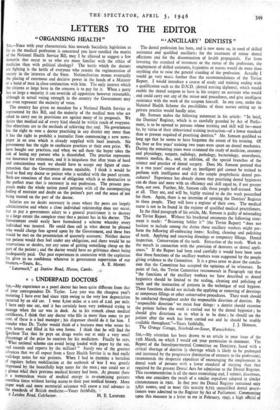LETTERS TO THE EDITOR
" ORGANISING HEALTH "
Sut,—Since with your characteristic bias towards Socialistic legislation as far as the medical profession is concerned you have extolled the merits of the National Health Service Bill, may I be allowed to suggest a few demerits that occur to us who are more familiar with the ethics of medicine than with political ideology? The battle which the doctors are fighting is the battle of everyone who resents the regimentation of society in the interests of the State. Nationalisation means eventually the placing of enormous and decisive power in the hands of a Minister or a band of men in close conjunction with him. The only interest which the citizens at large have in the concern is to pay for it. When a party has so large a majority it can override all opposition however reasonable, although in actual voting strength in the country the Government may not even represent the majority of votes.
The country has given no mandate for a National Health Service as represented by this Bill, and the majority of the medical men who are asked to carry out its provisions are against many of its proposals. We desire that medical aid of every kind should be within reach of everyone. Our objections are to the methods of achieving that end. No government has the right to veto a doctor practising in any district any more than it has the right to prohibit a journalist from commencing a new news- paper in an area which is already supplied with local journals. No government has the right to confiscate practices at their own price. We have bought our practices, and when we sell them the buyer takes the risk of losing any patient who is dissatisfied. The practice represents our insurance for retirement, and it is iniquitous that after years of hard and conscientious work we should have to accept any figure of com- pensation that the Government deems equitable. I think it would be hard to find any doctor or patient who is satisfied with the panel system. Both are conscious of that sense of obligation which is so destructive to
the perfect trust that is necessary in our profession. The present pro-
posals make the whole nation panel patients with all the accompanying feeling of restraint and doubt on the patient's part and the sense of not
being trusted on the part of the doctor.
Salaries are no doubt necessary in cases where the posts are largely administrative and where a close individual relationship does not occur, but to pay a government salary to a general practitioner is to destroy
to a large extent the complete trust that a patient has in his doctor. The Government could easily have formulated a scheme whereby every individual was insured. He could then call in what doctor he pleased who would charge fees agreed upon by the Government, and these fees would be met on the presentation of quarterly accounts. Neither doctor
nor patient would then feel under any obligation, and there would be no
reservations or doubts, nor any sense of getting something cheap on the part of the patient ; and the doctor would have no grievance about being inadequately paid. Our past experiences in connexion with the capitation fee gives us no confidence whatever in government supervision of our
finances.—Yours, &c., A. E. MOORE. " Lavernock," 45 Station Road, Histon, Cambs.






























 Previous page
Previous page